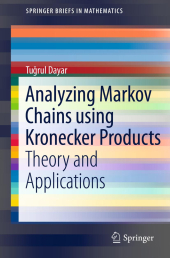 Neuerscheinungen 2012Stand: 2020-01-07 |
Schnellsuche
ISBN/Stichwort/Autor
|
Herderstraße 10
10625 Berlin
Tel.: 030 315 714 16
Fax 030 315 714 14
info@buchspektrum.de |

Tugrul Dayar
Analyzing Markov Chains using Kronecker Products
Theory and Applications
2013. 2012. ix, 86 S. 3 SW-Abb. 235 mm
Verlag/Jahr: SPRINGER, BERLIN 2012
ISBN: 1-461-44189-7 (1461441897)
Neue ISBN: 978-1-461-44189-2 (9781461441892)
Preis und Lieferzeit: Bitte klicken
Kronecker products are used to define the underlying Markov chain (MC) in various modeling formalisms, including compositional Markovian models, hierarchical Markovian models, and stochastic process algebras. The motivation behind using a Kronecker structured representation rather than a flat one is to alleviate the storage requirements associated with the MC. With this approach, systems that are an order of magnitude larger can be analyzed on the same platform. The developments in the solution of such MCs are reviewed from an algebraic point of view and possible areas for further research are indicated with an emphasis on preprocessing using reordering, grouping, and lumping and numerical analysis using block iterative, preconditioned projection, multilevel, decompositional, and matrix analytic methods. Case studies from closed queueing networks and stochastic chemical kinetics are provided to motivate decompositional and matrix analytic methods, respectively.
Introduction.- Background.- Kronecker representation.- Preprocessing.- Block iterative methods for Kronecker products.- Preconditioned projection methods.- Multilevel methods.- Decompositional methods.- Matrix analytic methods.
From the reviews:
"Dayar´s book on Kronecker products for Markov processes addresses an important topic which, up to now, has not been thoroughly discussed as a single entity in the literature. ... The book has numerous examples throughout to illustrate the results and methods which the author presents. ... the book is a valuable tool for learning to apply Kronecker representation to continuous time Markov chains." (Myron Hlynka, Mathematical Reviews, May, 2013)


